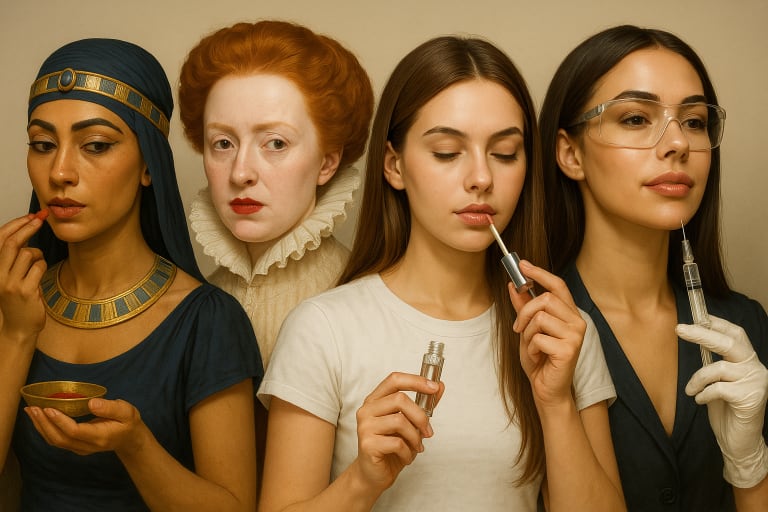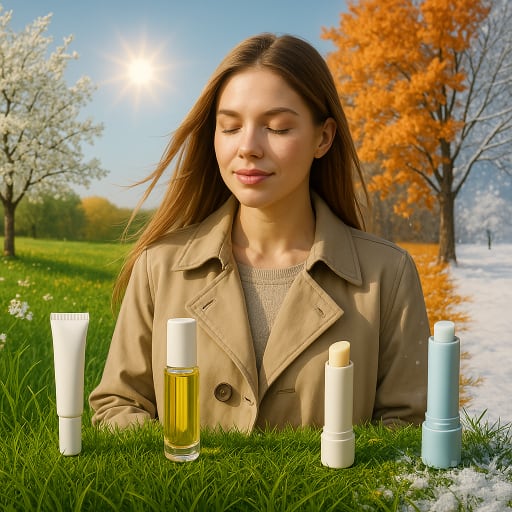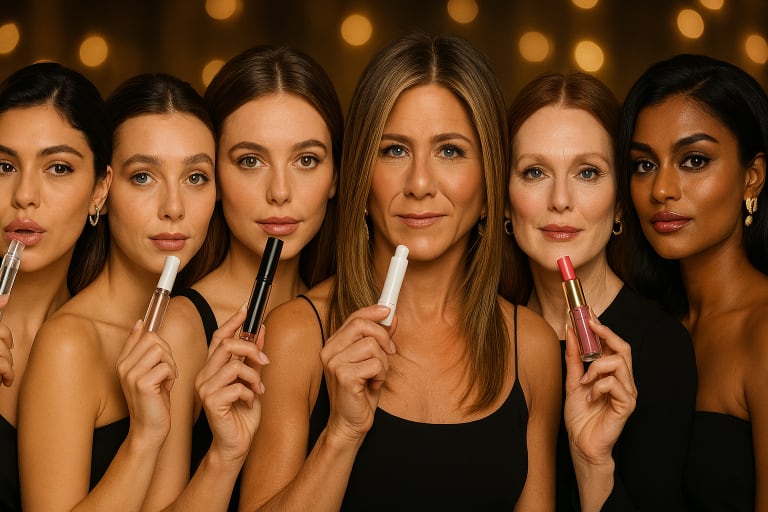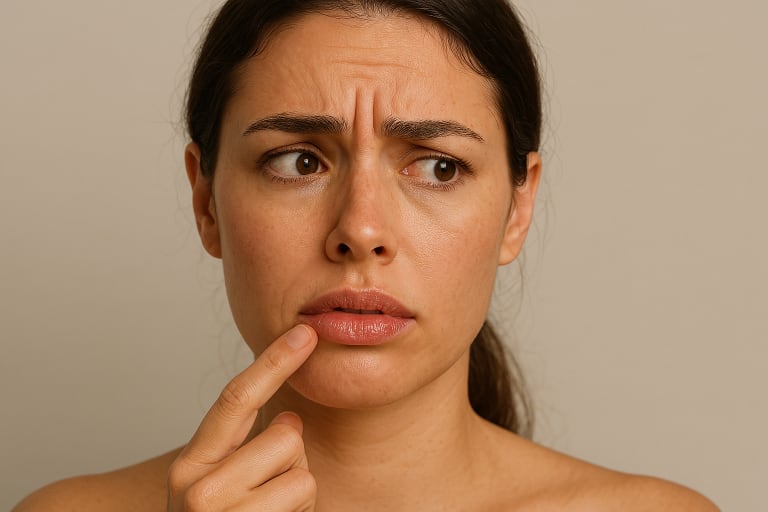From crushed beetles in ancient Egypt to viral TikTok suction hacks, the pursuit of plump lips has shaped beauty standards for millennia. This deep dive reveals how lip enhancement evolved from risky rituals to billion-dollar biotech—and uncovers shocking, hilarious, and groundbreaking moments in pout-perfecting history.
Lip Enhancement Through the Ages
3500 BC
Ancient Egyptian Lip Rouge
Egyptians crushed cochineal beetles to create red lip pigment. Queen Nefertiti used gold dust on lips to signify divine status.
200 BC
Chinese Bite & Blush
Chinese nobility bit their lips repeatedly and applied herbal poultices containing mercury to create a swollen, flushed appearance.
1500s
Elizabethan Toxic Gloss
Queen Elizabeth I's court used mercury-laced vermilion paste, causing hair loss, nerve damage, and early deaths among noblewomen.
1906
Paraffin Wax Injections
Doctors injected hot liquid paraffin using unsterilized metallic syringes, leading to disfiguring tumor-like growths.
1960s
Silicone Era
Hollywood stars used industrial-grade silicone for permanent plumping, resulting in migration and chronic inflammation.
1980s
Bovine Collagen
First FDA-approved filler used cow-derived collagen. Required six allergy tests over 3 months for results lasting just 3-6 weeks.
1996
Hyaluronic Acid Revolution
Swedish scientists developed Restylane®, the first HA filler that bound 1,000x its weight in water and dissolved naturally.
2007
Celebrity Endorsements
Paris Hilton's Juvederm® sponsorship made plumped lips mainstream, beginning the era of celebrity influence on lip trends.
2015
#KylieJennerChallenge
Viral social media trend saw teens using shot glasses for DIY suction plumping, causing burst capillaries and ER visits.
2020s
Non-Invasive Innovations
LipLase® laser treatments, peptide-infused glosses, and edible HA supplements transform the market with safer alternatives.
2025+
Future Frontiers
mRNA fillers, neural-adaptive plumpers, and algae-based sustainable options represent the next generation of lip enhancement.
3500 BC
Ancient Egyptian Lip Rouge
Egyptians crushed cochineal beetles to create red lip pigment. Queen Nefertiti used gold dust on lips to signify divine status.
200 BC
Chinese Bite & Blush
Chinese nobility bit their lips repeatedly and applied herbal poultices containing mercury to create a swollen, flushed appearance.
1500s
Elizabethan Toxic Gloss
Queen Elizabeth I's court used mercury-laced vermilion paste, causing hair loss, nerve damage, and early deaths among noblewomen.
1906
Paraffin Wax Injections
Doctors injected hot liquid paraffin using unsterilized metallic syringes, leading to disfiguring tumor-like growths.
1960s
Silicone Era
Hollywood stars used industrial-grade silicone for permanent plumping, resulting in migration and chronic inflammation.
1980s
Bovine Collagen
First FDA-approved filler used cow-derived collagen. Required six allergy tests over 3 months for results lasting just 3-6 weeks.
1996
Hyaluronic Acid Revolution
Swedish scientists developed Restylane®, the first HA filler that bound 1,000x its weight in water and dissolved naturally.
2007
Celebrity Endorsements
Paris Hilton's Juvederm® sponsorship made plumped lips mainstream, beginning the era of celebrity influence on lip trends.
2015
#KylieJennerChallenge
Viral social media trend saw teens using shot glasses for DIY suction plumping, causing burst capillaries and ER visits.
2020s
Non-Invasive Innovations
LipLase® laser treatments, peptide-infused glosses, and edible HA supplements transform the market with safer alternatives.
2025+
Future Frontiers
mRNA fillers, neural-adaptive plumpers, and algae-based sustainable options represent the next generation of lip enhancement.
Ancient Beginnings: Nature's Original Lip Kits (3500 BC–1800s)
Long before Kylie Jenner's Lip Kits, our ancestors used radical methods to accentuate their smiles:
Cochineal Insect Rouge (3500 BC)
Ancient Egyptians created the first "lipstick" by crushing carmine beetles into crimson powder—a practice still used in some cosmetics today. Queen Nefertiti paired this with gold-dusted lips to signify divine status.
Bite-and-Blush Technique (200 BC–500 AD)
Chinese nobility achieved flushed lips through repetitive biting and herbal poultices containing toxic mercury compounds. Historical texts describe "swollen lips resembling summer peaches" despite the health risks.
Elizabethan Toxic Gloss (1500s)
Queen Elizabeth I's signature pale face contrast made lips a focal point. Her court used mercury-laced vermilion paste that caused hair loss, nerve damage, and early deaths among noblewomen.
The Dangerous Dawn of Modern Enhancement (1900–1980s)
The 20th century brought terrifying "advancements" in lip augmentation:
Paraffin Wax Catastrophe (1906)
Doctors injected hot liquid paraffin using unsterilized metallic syringes, leading to disfiguring "paraffinomas"—tumor-like growths requiring surgical removal.
Silicone Nightmares (1960s)
Hollywood starlets used industrial-grade silicone for permanent plumping, resulting in migrating filler that created "duck lips" and chronic inflammation.
Bovine Collagen Era (1980s)
The first FDA-approved filler used cow-derived collagen. Patients endured six allergy tests over 3 months for results lasting just 3-6 weeks—at $3,000/session ($8,500 today).
The Hyaluronic Acid Revolution (1996–2010s)
The discovery of hyaluronic acid (HA) transformed lip enhancement:
1996 Breakthrough
Swedish scientists developed Restylane®, the first HA filler that:
- Bound 1,000x its weight in water
- Dissolved naturally in 6-12 months
- Required no allergy testing
Celebrity Boom (2000s)
Reality TV accelerated demand:
- Paris Hilton's 2007 Juvederm® sponsorship made "trout pout" mainstream
- Kardashian-Jenner Effect: Between 2015-2020, lip filler demand spiked 312% per ASPS data
Social Media Dangers
The 2015 #KylieJennerChallenge saw teens using shot glasses for DIY suction plumping, causing:
- 68% participants with burst capillaries
- 23% requiring ER visits for bruising/swelling
Did You Know?
During World War II, when cosmetics were rationed, British women created makeshift lip color by mixing beet juice with lard. This "victory red" became a symbol of resilience and maintaining beauty standards even during wartime hardship.
Modern Marvels & Cultural Shifts (2020s–Present)
Today's $5.9B lip enhancement market blends tech with tradition:
Non-Invasive Innovations
- LipLase® Laser Treatments: Stimulate collagen via Nd:YAG lasers (82% satisfaction in trials)
- Peptide-Infused Glosses: Buxom's proprietary formula increases lip volume 19% in 20 minutes
- Edible Fillers: Korean brand MZ Skin's HA gummies boost hydration 200% in 4 weeks
Regional Trends Reshaping Beauty
- Russian Lips (2021–): Vertical filler threads create dramatic "flat" profiles favored in Eastern Europe
- Fox Eye Lift Combo (2023): 43% of U.S. patients pair lip filler with temporal brow lifts for "siren" eyes
- Male Market Boom: 18-34yo male procedures up 89% since 2020 via subtle "Brotox Lips"
Disturbing Resurgence of Vintage Risks
- "Vampire Lips" (2024): Blood-derived platelet injections cause dangerous clots in unregulated clinics
- Illegal Silicone Parties: Underground "pumpkin plump" events offer $200 injections using tire-sealant-grade materials
Future Frontiers: 2025–2030 Predictions
Biotech Breakthroughs
- mRNA Fillers: Custom HA synthesis via genetic coding (Phase II trials)
- Neural-Adaptive Plumpers: Glosses using AI to adjust tingling based on user pain tolerance
Sustainability Shift
- Algae-Based Fillers: L'Oréal's 100% bio-sourced HA reduces carbon footprint 73%
- Refillable Cartridge Systems: MAC's zero-waste plumping pen cuts packaging waste 90%
Cultural Reckoning
- "Zoom Dysmorphia" Laws: Class-action suits target apps for AR filters distorting self-perception
- Post-Filler Backlash: #NaturalLipMovement gains 18M TikTok followers advocating fat grafting reversals
10 Shocking Lip History Facts
- Mummified Lips: Ancient Peruvian nobles used cactus spine tattoos to permanently darken lips.
- WWII Ration Gloss: British women mixed beet juice with lard when cosmetics were scarce.
- HIV-Era Panic: 1980s collagen fears led to "needle-free" suction devices sold via late-night TV.
- Filler Black Market: 1 in 5 Instagram-sold lip kits contain unapproved silicone oils (FDA 2024).
- Celebrity Insurance: Kim K's lips are reportedly insured for $10M with Lloyds of London.
- Space Beauty: NASA tests HA fillers' stability in zero gravity for Mars mission aesthetics.
- Vegan Vampire Tech: Modern "vampire facials" use plant-based growth factors from fermented seaweed.
- Lip Sync Syndrome: 22% of Gen Z think overfilled lips improve TikTok video engagement.
- Historical Hallucinogens: 1800s "Belladonna Lip Drops" used pupil-dilating nightshade extracts.
- Cryo-Plumping: 2024's "-196°C lip popsicles" temporarily freeze tissue for swollen pouts.
Conclusion: Lips as Cultural Canvas
From Cleopatra's insect-stained pout to AI-powered "smart glosses," lip enhancement mirrors humanity's evolving relationship with beauty, power, and technology. As we enter an era of ethical bioengineering and digital dysmorphia, one truth remains: The quest for perfect lips will always balance innovation with obsession—often at razor's edge between groundbreaking and grotesque.
What's next? CRISPR-edited lip DNA? Holographic plumping filters? However it unfolds, the next chapter in lip history promises to be anything but thin.
Ready to try modern lip plumping products?
Explore our curated selection of safe, effective lip enhancement products that have evolved from centuries of beauty innovation.
Shop Lip Plumping Products



